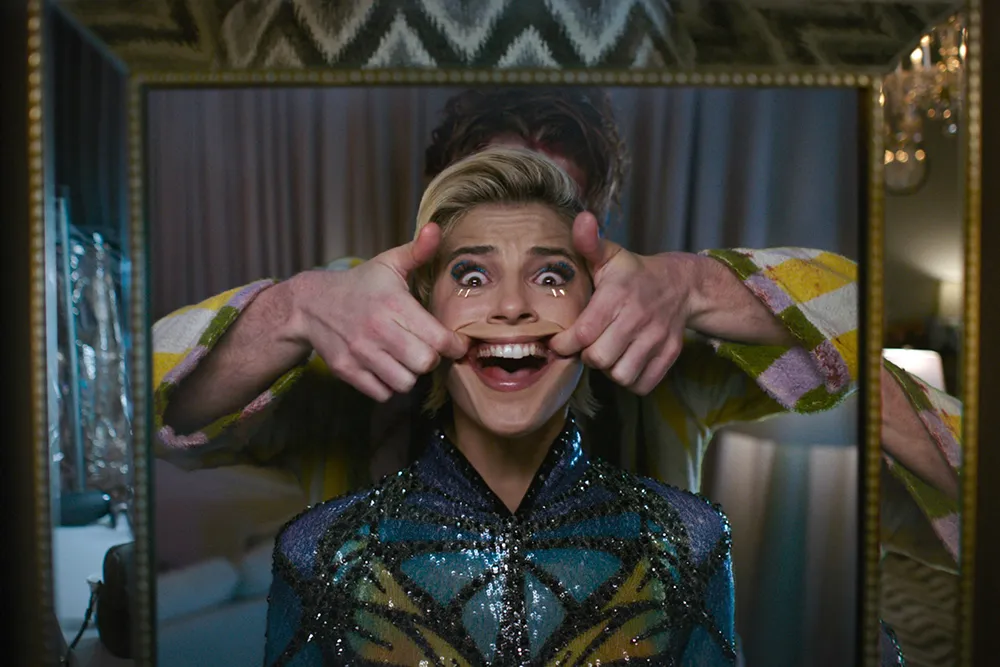LFF 2022 Review: Sam Mendes’ Cinema Love Story ‘Empire of Light’
by Manuel São Bento
October 21, 2022
When a film brings in many of Hollywood’s most talented people to work on every technical component, it’s hard not to have high expectations. Empire of Light has acclaimed British filmmaker Sam Mendes as both writer & director, beloved cinematographer Roger Deakins as the Director of Photography, award-winning Lee Smith in the editing room, and acclaimed composers Trent Reznor and Atticus Ross on the score, not to mention a cast with a few prominent names – there’s an interesting mix with less known actors in the ensemble. Many of these people are Oscar winners, along with so many other awards. The only unknown variable – Mendes writing his first-ever solo screenplay – turns out to be the only divisive factor…
Empire of Light is one of those movies with technical attributes worthy of dozens of nominations but all of that cannot bring the two pillars of cinema up to the same level: story and characters. Truth be told, without these two important “details”, it doesn’t matter how impressive the film sounds or looks. Without viewers’ emotional investment, the film will never have a significant impact. Obviously, this also doesn’t imply that the technical elements are unimportant or aren’t enough to create a must-watch movie.
The narrative premise of Empire of Light pays homage to the magic of cinema and the potential that art and its community hold to find the light amid the darkness. Roger Deakins presents an expectedly stunning 1980s British coastline, where the cinematographer’s sublime creativity and vision elevate the overall work. Bearing in mind his latest projects before this (including 1917 and Blade Runner 2049), Deakins doesn’t seem to have much resting on his shoulders, with fairly little opportunity to really amaze audiences with a particular shot. However, when those chances do arise, the visuals are indeed fascinatingly inspiring.
For me personally, Empire of Light’s score is the most memorable technical aspect and the one that most comforts viewers’ hearts. Reznor and Ross always arrange lovely melodies with the piano, and, unlike Deakins, they have more moments to shine with this film. Music is vital to the magical atmosphere that surrounds the film, whether it’s a walk by the sea, a seat in a theater, or even in the projection room itself. Smith’s editing also contributes to these sequences, never cutting off – literally – the emotion in crescendo.
The biggest problem – and only one, honestly – is the screenplay itself. Mendes has a clear idea of what he wants for the main narrative; frankly, the filmmaker manages to execute his plan efficiently. Nevertheless, several secondary storylines with a great amount of thematic weight are barely developed, even being used practically as if they were “objects” to bring in some extra entertainment or conflict. From constant racism on the part of white supremacists to mental health, Empire of Light handles these topics far too lightly.
When Sam Mendes focuses on the characters and the relationships between them, as well as their shared motivation to help cinema return to the great times of yore, Empire of Light becomes captivating and easy to form an emotional connection with. Unfortunately, the aforementioned issues inevitably return to the center of the conversation, but Mendes is unable to explore them, nor to convey a genuinely meaningful message, even completely forgetting about his own foreshadowing.
I do worry about the target audience and their possible indifference to the main topic. Empire of Light is undoubtedly a beautiful ode to the art it represents, but I don’t know how far that will suffice for most audiences. For example, there’s a sequence in the movie theater that, personally, left me enchanted and with my eyes transfixed – and even a little teary – on the big screen. This is partially due to the immense passion I hold for the art of filmmaking, but the truth is that most viewers don’t care about anything that has to do with tech technicalities of movies being projected on the screen.
I cannot end this without mentioning the superb performances from the entire cast. Olivia Colman adds her name to the list of contenders for Best Actress, once again, with yet another divine performance – more complex than it seems. Hilary suffers from mental health issues, where loneliness, depression, emotional breakdown, and “forbidden loves” build a bittersweet arc. Micheal Ward also suffers as Steven, a Black boy who tries to deal with the regular racially-motivated attacks, offering a light at the end of the tunnel for Hilary. He shows her that even in an imperfect world, there still are people and places to which we must cling. Toby Jones stands out from the rest of the supporting cast with a surprisingly touching display – I wasn’t familiar with his sentimental side before this.
Final Thoughts
Sam Mendes’ film Empire of Light works best as a love letter to the art of filmmaking and the enchanting theatrical experience. Brilliant performances all around. Astonishing to behold. Emotional to listen to – the film’s score is the technical highlight. Not so captivating narratively, considering that Mendes’ first solo screenplay lacks depth in the most important themes. It’s a beautiful tribute to the magic of cinema that cinephiles will enjoy, but for viewers less passionate about the 7th art, it might be difficult to genuinely care.
Manuel’s London Rating: B-
Follow Manuel on Twitter – @msbreviews / Or Letterboxd – @msbreviews


















:quality(85):upscale()/2023/11/08/625/n/1922564/507b6f4a654b949e9e3d42.85169557_.jpg)










